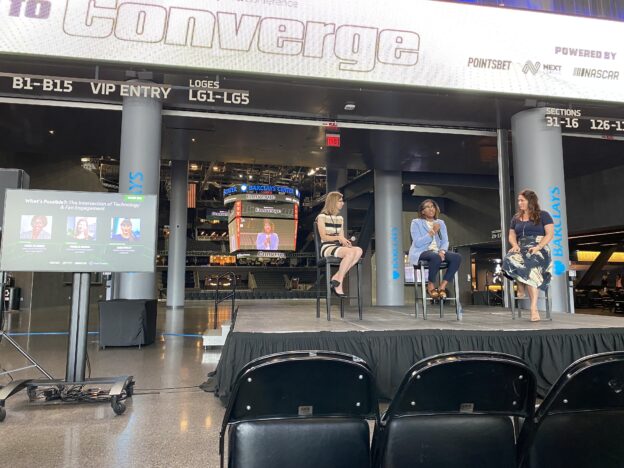by Noah Zaret, special to The Daily Payoff
On June 14, I had the opportunity to attend the SportiConference Converge, organized by Sportico at the Barclays Center in Brooklyn, NY. Having been to the Barclays Center a handful of times for sporting events as well as concerts, I was excited to see the venue in a different light.
Throughout the day, there were many discussions led by industry professionals who have experiences in a variety of areas in the sports business industry. Topics included: “Future Fans: Enhancing the Engagement of new audiences”, “What’s Possible?: The intersection of Technology & Fan Engagement”, “State of the Industry: Marketing & Advertising amongst Giants and Economic Uncertainty”, “Risk and Rewards: A behind the scenes look at the acceleration of Sports Betting”, “Web 2.0 vs Web 3.0: The Future Sports Platforms”, “Generating Higher Fan Engagement”, and “How Brooklyn Built the Metaverse”. All of these discussions had their own twist to them. I sincerely believe that I left the conference with a greater knowledge base and understanding of the current issues affecting the sports industry than I had prior to attending.
There were many takeaways and information that I learned from attending the conference. One of the main topics was enhancing the engagement of new and future audiences in sport. TikTok has become more than just a platform for lip sync and dancing, as it is now being used to advance the fan experience in sports and highlights. In the minds of content creators, one has to put themselves in the seat of the users and ask themselves what does the user want to see? Publishers are now partnering with content creators to plan, create and deliver the best content possible. Due to the fact that TikTok contains an untapped audience, the ability to take risks and experiment with content is prevalent amongst content creators. This was extremely beneficial during the peak of the Covid-19 pandemic. Archive content was very popular during the pandemic without live sports and has carried over post pandemic. For example, say it is an athlete’s birthday, content creators will work with publishers to post his/her career highlights and/or famous clips. TikTok will continue to provide content in a variety of ways that will enhance the engagement of current and future audiences.
The impact that technology has on fan engagement has increased significantly as of late. The New York Liberty was the first WNBA team to release their own NFT. Not only does this educate fans about digital assets, but it also has the opportunity to draw in more fans, especially women. Just like TikTok is enhancing the mobile experience, Seatgeek is a company that is using technology to enhance the fan experience for those attending live events. Paula Segal, head of consumer product for SeatGeek, mentioned that Covid accelerated the switch to digital tickets and that tickets are now more than just a barcode. They can be used for mobile food ordering, buying merchandise and persuading fans to bet on the sport event itself. These examples are part of a movement to use technology to enhance the in-game experience instead of focusing solely on technology being used outside the arena or stadium.
The growing acceleration of sports betting and the marketing and advertising amongst the giants in the industry was another topic that caught my attention. Sports betting companies are using other forms of media such as TV and radio to market and promote their product beyond basic advertising. Content creation such as gambling shows are done to help promote gambling companies and their respective sports books. CBS and ESPN are examples of sports channels that are broadcasting betting shows, an interactive approach to the promotion of sports betting. Sportsbooks are trying to differentiate themselves from competitors in the industry and gain competitive advantage by gaining loyal customers and keeping them engaged on their platform. Sports betters typically tend to choose their preferred sportsbook depending upon ease of use. Customers have the ability to switch sportsbooks at any time, so if they do not like one they can easily switch to another. In order for gambling companies to limit this from happening, they are attempting to innovate their sportsbooks to make them stand out and appear different to the average user. I believe that this is just the beginning for the sports betting industry, as there are endless opportunities for success in the future.
Lastly, the future of sport platforms and generating higher fan engagement was a popular topic of discussion. I learned that not only can fan engagement exist in the real world, but in a virtual environment as well. As said by Scott Lawin, CEO of Candy Digital, “sports is the gateway drug into NFT’s & Crypto”. As more teams and leagues are getting involved with digital assets, casual fans can begin to get an understanding of how they work. As there are more fans that are educated on this matter, the engagement will continue to improve over time. Lawin also mentioned that in three to five years, he expects purchasing consumer products, sporting event tickets and concert tickets will require an NFT attached to it. As this is my first “real world” exposure to NFT’s and Crypto, I am seeing how the emergence of NFT’s are at the center of the future of promotion. I plan on further educating myself on NFT’s, Crypto, Blockchain and the Metaverse, as I know they are and will continue to be pivotal components in the sports industry.
Overall, the SportiConference Converge was a great opportunity as I became more educated on the relevant topics in the industry today. I was also able to meet and converse with a variety of interesting and experienced professionals. Sportico should be commended for organizing such a successful event.
